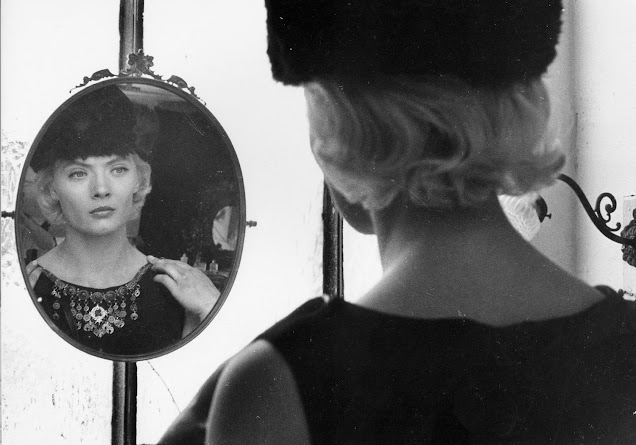Cleo From 5 to 7
Cleo Victoire is prone to high drama. With good reason. She is a pop singer, known for a few hits she hates to hear while out in public (but is distraught when no one around her pays attention to them). She is also awaiting test results which will reveal whether or not she has cancer. Writer/director Agnes Varda's 1962 CLEO FROM 5 TO 7 follows the young woman for about an hour and a half (in a more or less real time narrative) as she wanders around Paris. By 6:30, she will know her diagnosis. But the agony before! Interminable. Thankfully, Varda does not make her film feel that way.
We first see Cleo (Corinne Marchand) with a fortune teller, each tarot card pointing to death. This will be the only sequence in Varda's film to be in color, an interesting choice. Despondent, Cleo will take comfort in superficial things like her physical beauty and the black fur hat she buys. At least she isn't superstitious like her assistant, Angele (Dominique Davray), who thinks it's bad luck to buy something new on a Tuesday. Angele patiently listens to her boss' laments, but her thoughts tell us something different.
Cleo will spend a few minutes with a lover who is rarely around. Her pianist and songwriter who vainly try to cheer her up. A friend who poses nude for a sculpture class. The friend's boyfriend, a film projectionist. A soldier on leave from the war in Algeria. Curiously, as the film progresses, Cleo's relationships become healthier, more positive. Do we need to watch the fortune teller scene again to review?
With her second full length feature, Varda takes a bid from many existential works, filmic and otherwise, to create her own. Through Cleo's spoken words of the recognizance of her mortality and impending doom, Varda creates a brief essay on that most universal of concerns. The singer might accurately be deemed as shallow, with her self-reassurance that "as long as I'm beautiful, I'm alive". Her definition of validation. She certainly does not get this from her intermittent lover, or probably any other man in her life. So went the role of the woman in early '60s French society.
The director also uses the environment around Cleo to make perhaps subtler statements. All the mirrors. The constant news reports about the Algerian war. Antoine, said soldier, describing senseless death on the battlefield. The city of Paris itself, so beautifully captured by a trio of cinematographers: Jean Rabier, Alain Levent, and Paul Bonis. Varda's cinematic confidence, never tainted by faux sentiment, makes CLEO FROM 5 TO 7 both a breezy and urgent experience. This is the ancestor of so many feminist stories in the cinema. Surely Greta Gerwig took notice.
The existentialism never gets too pretentious. The pre-New Wave style never too showy. Ms. Marchand is very beautiful and convincing. There are amusing cameos by Anna Karina and Jean Luc-Godard.
My emotional connection to this film was not as strong as I expected/hoped, but this is a lovely film.



Comments